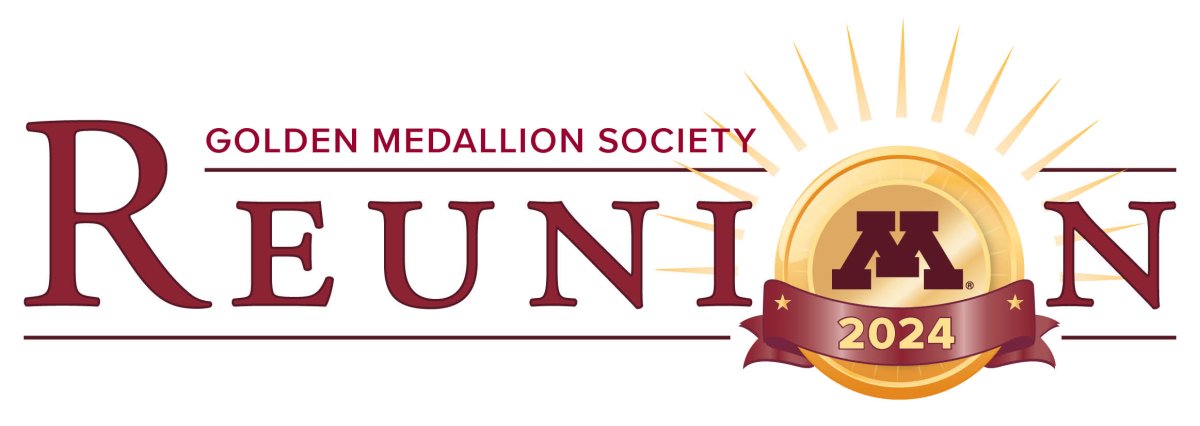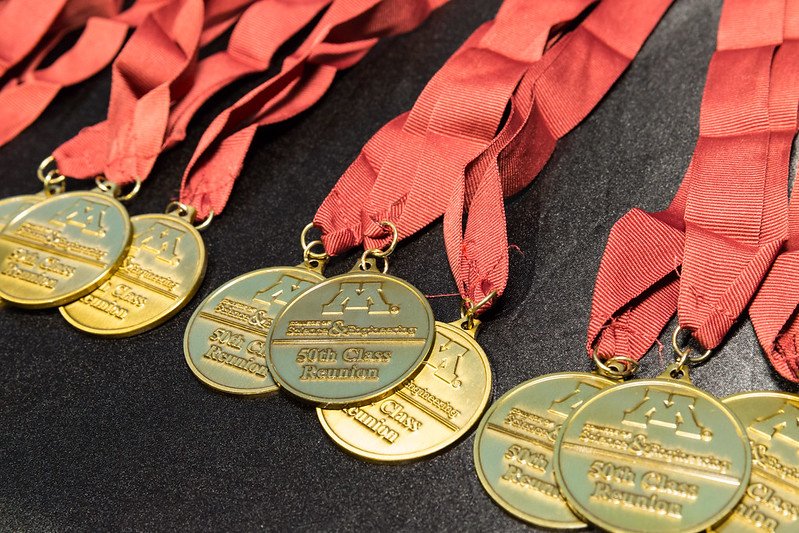CSE Golden Medallion Society Reunion

Huntington Bank Stadium (formerly TCF Bank Stadium)
2009 University Avenue SE, Minneapolis
U of M East Bank
On Wednesday, May 8, the U of M College of Science and Engineering (CSE) hosted its annual Golden Medallion Society Reunion. The celebration of alumni who graduated 50 or more years ago drew nearly 150 attendees to catch up with classmates, reconnect with faculty, discover new research and college initiatives, and see how CSE is preparing the students of today to be the leaders of tomorrow. If you were unable to attend this year's festivities, we hope to see you in 2025. Event dates will be announced this fall.
If you have questions, please e-mail us at csealumni@umn.edu or call Katie Sobolewski at 612-624-6694.
2024 Event Schedule and Session Descriptions
All events at Huntington Bank Stadium (formerly TCF Bank Stadium).
WEDNESDAY, MAY 8, 2024
9:30 a.m. Check-in/Light refreshments
10:15 a.m. Welcome by Dean Andrew Alleyne and Opening Keynote
“Research in CSE: Fulfilling our Mission for the State, Nation, and World”
Joe Konstan, Associate Dean for Research, Distinguished McKnight University Professor, Distinguished University Teaching Professor, Department of Computer Science and Engineering
This presentation provides an overview of research in the College of Science and Engineering. We look at how our faculty and students are working together to address the world's most important problems while advancing the core of science, engineering, and mathematics.
11:15 a.m. Department-Hosted Research Showcase Sessions
“Machines Discovering New Materials”—Department of Aerospace Engineering and Mechanics
Ellad B. Tadmor, Russell J. Penrose Professor
Recent advances in artificial intelligence (AI) are expected to have a profound impact on many aspects of our life. In the area of materials science, AI algorithms are already being used to discover new materials for a variety of applications. This talk will describe recent AI developments in materials research, their successes, and limitations.
“Reflections on a Decade of Department Leadership and the Bright Future Ahead for CEMS”—Department of Chemical Engineering and Materials Science
C. Daniel Frisbie, Distinguished McKnight University Professor and CEMS Department Head
“The Good, the Bad, and the Ugly . . . The Story of Microbes in Your Drinking Water”—Department of Civil, Environmental, and Geo- Engineering
Raymond M. Hozalski, James L. Record Professor
“Fueled by the Sun, Powered by the Mind”—Department of Electrical and Computer Engineering
UMN Solar Vehicle Project Team
Members of The University of Minnesota’s Solar Vehicle Project (SVP) will share the story of their second place finish in the 2023 Bridgestone World Solar Challenge (WSC) in Australia.
“Clean Water in Tanzania: CSE Undergraduate Students Experience Hands-On Global Engineering Challenges with Real-World Impact”—Department of Mechanical Engineering
Matt Anderson, Teaching Associate Professor and Director of Undergraduate Studies
Access to reliable clean water is one of the greatest challenges facing humanity today. For the past decade, CSE has offered a global seminar experience that brings a group of engineering students to Tanzania during winter break where students experience a hands-on engineering challenge with real-world impact evaluating the needs and infrastructure to model potable water-handling systems for a local village. Come and hear about their Winter 2024 experience.
12:15 p.m. Lunch
During this time, we will present medallions to members of classes prior to 1974 who have not previously been inducted into the Golden Medallion Society, as well as members of the Class of 1974 unable to attend Thursday's brunch.
1:30 p.m. Breakout Sessions
“Leveraging Social Theories to Enhance Human-AI Interaction”
Harmanpreet Kaur, Assistant Professor, Department of Computer Science and Engineering
Artificial Intelligence (AI)-based technologies are becoming more prevalent in our personal and professional lives, impacting everything from how we choose music to serious matters like predicting criminal behavior or reviewing loan applications. Kaur’s work follows the belief that for human-AI interaction to be effective and safe, it must be developed alongside an understanding of human-centric cognitive, social, and organizational phenomena. Without this understanding, AI applications can inadvertently reinforce biases or overlook important details, leading to harmful outcomes. In her talk, Professor Kaur will discuss her research, which focuses on evaluating existing AI applications based on human-centered criteria and proposes design guidelines for more effective and safe use of AI.
“Shrinking the Gap to a Growing Heart Valve for Kids”
Robert T. Tranquillo, Distinguished McKnight University Professor, Department of Biomedical Engineering
In 1987, the year Professor Tranquillo started at the U of M, the term "tissue engineering" was coined, and he dove into the deep end. Now, 37 years later, he and his team have shown that tubes of collagenous matrix (grown from donor skin cells) can be assembled into valved conduits made to function as heart valves that grow with lambs into adulthood. This research led to a start-up that implanted the tubes as vascular grafts into adults for life-saving blood dialysis. The advancement is also promising for children born with several heart defects. Currently, they must endure multiple surgeries because the replacement heart valves used today do not grow. Tranquillo is navigating a pediatric trial in hopes of changing that.
2:45 p.m. Closing Keynote
“Transforming Education in the Classroom”
Join us for a captivating panel discussion on constructing the Chemistry Undergraduate Laboratory Teaching building, a groundbreaking project central to CSE's commitment to education. This state-of-the-art facility is poised to revolutionize the landscape of STEM instruction at the University of Minnesota (UMN), reshaping how students engage in learning and research. This cutting-edge building is designed to elevate CSE's capabilities, catalyzing innovation and collaboration among nearly 5,000 undergraduate students annually. Join us as we explore the transformative potential of this new facility in shaping the future of education at UMN.
Panelists:
- David Blank, Associate Dean for Undergraduate Programs, Mr. and Mrs. George W. Taylor Distinguished Professor and Distinguished University Teaching Professor, Department of Chemistry
- Marc Partridge, AIA, CID LEED AP, University Architect, Design Director - Capital Project Management
- Elise Toussaint, Physiology ’21, Current University of Minnesota Medical School student
- Jennifer Yoos, Design Partner and President, VJAA
3:30-4:30 p.m. Dessert Reception
Mingle and reminisce over dessert and coffee.

